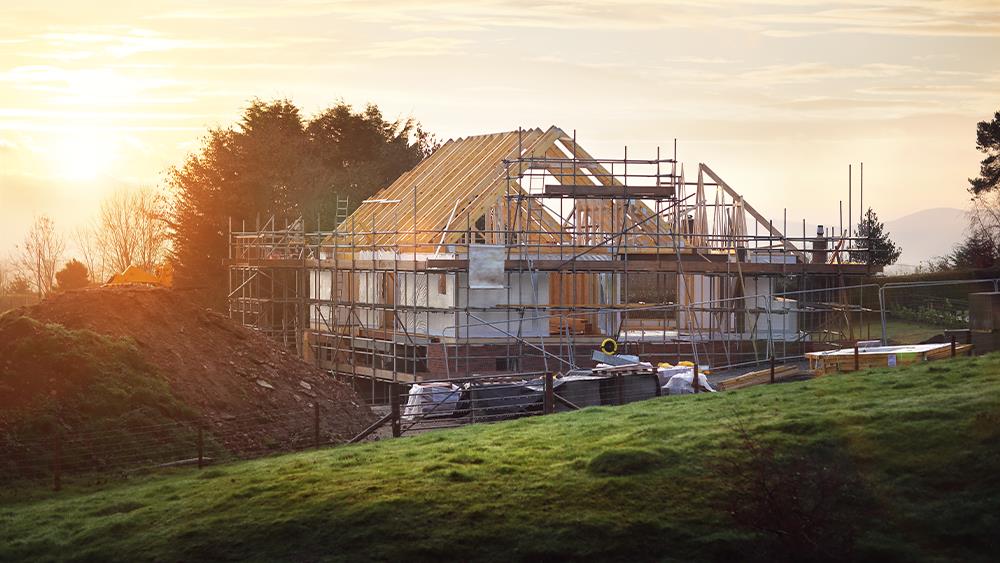

According to the online survey of 1,722 adults conducted on 8 and 9 December, 80% of respondents, who are representative of all UK adults, would support government regulations making solar panels the default on new-build houses, against just 9% who would oppose this.
Two-thirds (66%) believe battery storage should be included in new homes to increase the efficiency of solar panels, and 60% want to see heat pumps included in all newbuilds, with just 17% opposed.
The survey results come as the government prepares to consult on the proposed Future Homes Standard for England, which would set energy-efficiency requirements for homes built from April 2025.
Government proposals for the Future Homes Standard are expected to require new homes produce around 60% lower carbon emissions than the current building standards.
However, MCS Charitable Foundation, which commissioned the YouGov survey, argues that unless a requirement for all new builds homes to have solar panels, battery storage and heat pumps as standard are included in the Future Homes Standard, carbon targets will be hard to meet.
Furthermore, the government could be locking in future fossil fuel use by allowing new homes to be connected to the gas grid. MCS Charitable Foundation says gas grid connections would be obsolete for homes powered by renewables.
A majority of people (59%) believe new homes should have alternative heating sources, like heat pumps, rather than being connected to the gas grid. Just one-in-five people (18%) say they would not want an alternative heating source.
David Cowdrey, Director of External Affairs for MCS Charitable Foundation, said: “Placing renewable energy in new-build housing should be a no-brainer. This survey shows that the public overwhelmingly wants cheap, clean, efficient energy, and that means solar panels, heat pumps, battery storage and EV charging points in every new home.
“Making renewables mandatory under the Future Homes Standard would result in lower bills and carbon savings. It would provide a massive boost to an already-thriving renewables sector, and would improve energy security at no cost to the taxpayer.
“It is also vital that renewables are installed to the best standard, to support consumer confidence. MCS standards – which are already a requirement for getting Government grants for renewable installations – should be written into the Future Homes Standard.
“All the solutions we need to make the homes of tomorrow more energy-efficient, cheaper to run and fit for the future are already available. The introduction of the Future Homes Standard is a huge opportunity to make renewable energy the norm, which must happen if we are to meet national goals on climate change.”
Kara Davies, Residential Policy Analyst at Solar Energy UK, the trade body for the UK solar energy industry, said: “Combining a heat pump with solar power is one of the best ways to both decarbonise your home and save dramatically on energy bills. It also helps the whole country, in terms of energy security and net zero.
“So it is gratifying to see that the public has such a good appreciation of their benefits and supports our call for mandatory solar installations on new build homes from 2025.”
Bean Beanland, Director for Growth and External Affairs at the Heat Pump Federation, said: “The Heat Pump Federation warmly welcomes this research, not least because it chimes almost perfectly with what we are being told during our own increasingly frequent consumer engagements.
“It is essential that consumers are fully informed as to the financial implications for the future retrospective interventions that will be required if the new homes that they are buying are not Net Zero ready.
“The cost of getting this right at the time of build is significantly lower than the cost of retrofit. Knowing what we know now leaves no excuse for continuing to build homes that are not fit for 2050. It’s clear that home buyers want this step change, so the Future Homes Standard cannot come soon enough.”
If you'd like to keep up-to-date with the latest developments in the heating and plumbing industry, why not subscribe to our weekly newsletters? Just click the button below and you can ensure all the latest industry news and new product information lands in your inbox every week.